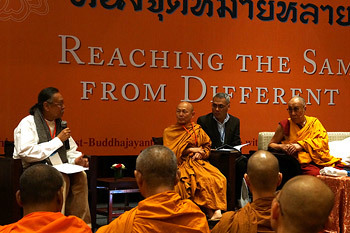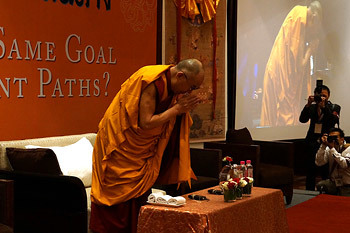New Delhi, India, 15th December 2012 - A significant and inspiring event took place today in New Delhi, capital of India the country where Buddhism originated 2600 years ago, when a group of Thai elders among nearly 50 monks and scholars met to engage in an inter-Buddhist dialogue with His Holiness the Dalai Lama. Discussants from the Thai side included Phrarajnyanakavi, Phra Dr Anil Sakya, Phra Paisal Visalo, Dr Seksan Presertkul, Dr Krissanapong Kirtikara and Dr Veerathai Santiprabhob, while His Holiness was accompanied by Prof Samdhong Rinpoche, Geshe Ngawang Samten, Geshe Lhakdor and Geshe Dorji Damdul. Nearly 300 lay Buddhists from Thailand listened rapt to their deliberations.
Words of welcome and respect were pronounced by a lady representative of the Buddhadasa Indapanno Archive that was influential in organizing the occasion. She mentioned His Holiness’s having been a spiritual friend to two Thai Elders and expressed the wish that relations between the Thai and Tibetan traditions should continue to flourish. She said the purpose of the dialogue was to strengthen faith in the Dharma; reinforce relations between Thais and Tibetans and to promote other beneficial activities.
A short film clip showing His Holiness’s second visit to Thailand in 1972 was shown, following which a message from the Thai Sangharaja, who is 100 years old, was read. He pointed out that this meeting was very much in accordance with tradition from the time of the Buddha. He noted that the Buddha was remarkably open-minded and ready to listen to others, only offering his own views when invited to do so. While Buddhism has taken on different forms in different places, these differences should not be thought of as grounds for unthinking discrimination, but should encourage us to come together in dialogue to eliminate misunderstanding.
His Holiness began his address with customary words of greeting:
“Respected Bhikkshus, Buddhist brothers and sisters, welcome. I am very happy to see this large gathering of Thai Buddhists, including many monks. Since my first visit to Thailand in 1967, I have been impressed by the strength of Buddhism in your country. I recall that in my conversations with the Sangharaja at that time I asked what he thought of the fact that while Christian monks and nuns engage in widespread social work, we Buddhists tend not to do so. His reply was that it was the rule for Buddhist monks to remain in their monastery to study and cultivate shamatha.”
His Holiness’s voice was a little hoarse, partly the result of his having a cold, but also because he has just come from giving long teachings to some 20,000 monks in South India, during which he spoke for altogether sixty hours over the last two weeks.
Noting that like all other composite phenomena, Buddhism is impermanent and will disappear, His Holiness said it has survived for 2600 years due to the support of its followers, mostly monks. Now in the twenty-first century, even in countries with no previous tradition of Buddhism, interest is growing among ordinary people and scientists. He said that what he thinks of as the Pali tradition, to which Thai Buddhism largely belongs, is the very foundation of all Buddhist traditions. The ethics and discipline described in the Vinaya are the foundation for training both in concentration (shamatha) and insight (vipassana). He clarified that with the help of concentration our mind has the ability to remain still and by applying analysis we achieve understanding.
“However,” he said, “we must remember the rest of humanity. If we can create a more peaceful world, everyone benefits. And to achieve this I think we need to take a more secular, rather than a religious, approach to fostering ethics. Karuna or compassion really brings about inner peace and inner strength. Those who practise compassion become calmer and less subject to fear.”
He backed this up by reporting that scientists have also found that when you have compassion, your physical as well as your mental health improves.
When it came to questions and answers, His Holiness had some questions of his own. He wanted to know if there was any tradition of Bhikkshuni ordination - full ordination of nuns - in the Thai tradition, bearing in mind that we know such a tradition existed during the life of the Buddha. He also wanted to know about the apparent ordination of trees and it was made clear that this was a case of protecting trees by wrapping them in the monastic robes that command universal respect in Thailand.

|
| His Holiness the Dalai Lama and Thai Buddhist scholars during their discussion in New Delhi, India, on December 15, 2012. Photo/Jeremy Russell/OHHDL |
Asked about Buddhist practice for lay people, His Holiness said that evidently the Buddha considered lay people and monastics have an equal opportunity and it is equally possible for them to achieve liberation and enlightenment. However, monastics, with no family responsibilities only have themselves to look after and so have more time to practise. To another question about a Tibetan reference to the inseparability of samsara and nirvana, His Holiness laughed and said if we were to take this at face value, we’d have to wonder why the Buddha gave up his royal life and engaged in austerities and meditation for six years. Clarifying what happiness is he drew a distinction between short-lived sensory satisfaction like listening to music or enjoying delicious food and the more durable joy derived from mental happiness. This is an area that needs further exploration he said, remarking that English and other Western languages lack the vocabulary to discuss these matters adequately.
After lunch, speaking about “Solutions to World Problems” His Holiness referred to the violence and bloodshed that mark the twentieth century during which some historians say 200 million people died violently. He said,
“We need to find a new approach to creating a better world. We have major problems to deal with: climate change, population increase, the gap between rich and poor, and corruption. People voice anxiety about an ancient Maya prediction of the imminent end of the world, but unless we address corruption, which is like a cancer, we will face disaster. Religion is important, but has failed to check it. Democracy, the rule of law and freedom of the press should be able to put a stop to corruption, but they have failed to do so too. Even in China where these qualities are absent and all power is centralized, corruption remains rampant. The key factor is a lack of self-discipline and moral principles.”
He said once more that we need to find ways to promote secular ethics that flow from common sense and scientific findings.
“We should remember that the Buddha taught for the benefit of all human beings. We too are part of humanity. To solve these problems we have a responsibility to work together. As a Tibetan Buddhist my concern is for the whole of humanity, you too should consider more than just Thailand and Bangkok.”
Questioned about the global economic crisis, His Holiness said he was surprised when it happened and he’d asked friends about the cause. They told him that it occurred because of too much greed and speculation, so to an extent ignorance was involved. He pointed out the need to distinguish between greed and desire, because there can be positive desire such as the wish for liberation and Buddhahood.
With regard to compassion, His Holiness drew a distinction between the biased compassion we may feel for those who are close to us and the kind of pure unrestrained compassion that is able to view even our enemies as fellow human beings in need of help. Reminded that last year he said that Nirvana is not achieved through chanting and prayer, His Holiness was asked how to cultivate a proper view. He said,
“Cultivating a more holistic and realistic view takes time and steady effort. As I said I have just given a long and thorough teaching to 20,000 monks in South India. Did it bring about immediate change in their minds? I doubt it. They need to work at it over a longer period. What we need to aim for now is a kind of emotional balance; eliminating our destructive emotions is difficult but it can be done. We need to be rigorous in our training. Thank you, see you tomorrow.”














